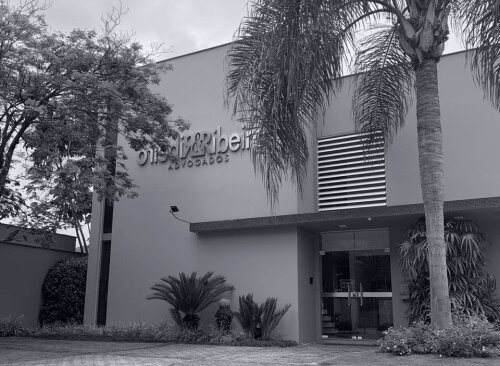
Best Class Action Lawyers in Brazil
Share your needs with us, get contacted by law firms.
Free. Takes 2 min.
Or refine your search by selecting a city:
List of the best lawyers in Brazil

About Class Action Law in Brazil
Class actions in Brazil, known as "ação coletiva," are legal tools that allow a group of individuals or entities who have suffered similar harm to collectively bring a lawsuit against a defendant. This mechanism aims at providing efficiency in the legal process by addressing the grievances of a large number of people through a single legal proceeding, which otherwise might lead to numerous similar individual lawsuits. The Public Civil Action Act of 1985 and the Class Action Law (Law No. 7,913/89) are key legislations governing class actions, enabling consumer protection and covering a broad range of interests including environmental, consumer rights, economic order, and minority protection.
Why You May Need a Lawyer
Engaging a lawyer for a class action suit in Brazil can be essential in several situations:
- Complexity of Law: Class action proceedings can involve intricate legal arguments and special procedural steps that require expert navigation.
- Representation: Whether you're organizing a class action or joining one, legal representation ensures that your rights and interests are effectively protected.
- Litigation Risks: A lawyer can assess the risks involved, including potential costs and the merits of your case, to provide informed advice before proceeding.
- Negotiation and Settlement: Experienced legal professionals are critical in negotiating settlements that fairly compensate the parties involved.
- Post-Judgment Remedies: Lawyers provide guidance on enforcing judgments or filing appeals if necessary.
Local Laws Overview
Brazilian class actions are informed by several legislative pillars:
- Public Civil Action Act: This law provides the procedural framework for public civil actions in Brazil, covering environmental, consumer, and antitrust issues.
- Consumer Defense Code (CDC): Under the CDC, class actions can be filed not only on behalf of consumers but also to protect diffuse, collective, and individual homogeneous rights.
- Exclusive Standing: Certain entities like the Public Prosecutor's Office, associations, and public agencies have standing to file class actions in Brazil.
- Cost and Fees: One notable aspect of Brazilian class action law is that, typically, plaintiffs involved in class actions are not required to cover defendants’ attorney fees if they lose, a provision aimed to encourage the filing of socially beneficial suits.
Frequently Asked Questions
1. What is the purpose of a class action in Brazil?
Class actions aim to address situations where a large number of people have been harmed by the same cause, thereby streamlining the legal process and conserving judicial resources.
2. Who can initiate a class action in Brazil?
Entities such as the Public Prosecutor's Office, certain government agencies, and registered associations have standing to initiate class actions.
3. Can individuals directly participate in a class action?
Individuals can join existing class actions but cannot file on their own unless represented by an organization with standing.
4. How does a class action benefit individual claimants?
Class actions allow individuals to combine efforts, share costs, and potentially influence better outcomes than pursuing claims independently.
5. What types of cases are typically suitable for class actions?
Cases involving consumer rights, environmental issues, financial services, and labor disputes are commonly addressed through class actions.
6. Are there risks involved in joining a class action?
The main risk is related to the collective outcome, which might not satisfy all individual claimants' expectations. Legal counsel can help assess these risks.
7. How long does a class action take to resolve?
The duration varies widely and depends on the complexity of the case, the number of parties involved, and court schedules, but it can often take several years.
8. What happens if I opt-out of a class action?
If you opt-out, you retain the right to file an individual lawsuit but forfeit any benefits from the class action settlement or judgment.
9. How are settlements distributed in a class action?
Settlements are usually distributed based on criteria set in the settlement agreement, subject to court approval to ensure fairness to all class members.
10. Can a class action decision be appealed?
Yes, either party can appeal a class action decision, which will then be reviewed by a higher court.
Additional Resources
For further assistance, you may consider reaching out to the following resources:
- Procon: A state-based consumer protection agency that can provide guidance on consumer-related class actions.
- Ministério Público (Public Prosecutor's Office): Can offer insights on ongoing and potential public interest class actions.
- Consumer Protection Agencies: Non-governmental organizations focused on consumer rights.
- Legal Aid Societies: Organizations providing legal aid for those unable to afford legal representation.
Next Steps
If you believe you need legal assistance with a class action, consider the following steps:
- Consultation: Schedule a meeting with a lawyer familiar with class action law to discuss the specifics of your situation.
- Evidence Gathering: Begin collecting all relevant documentation and evidence that could support your case.
- Stay Informed: Research existing class actions that may be relevant to your situation through online databases or legal firms' platforms.
- Seek Support: Engage with support groups or forums to connect with others facing similar issues.
Lawzana helps you find the best lawyers and law firms in Brazil through a curated and pre-screened list of qualified legal professionals. Our platform offers rankings and detailed profiles of attorneys and law firms, allowing you to compare based on practice areas, including Class Action, experience, and client feedback.
Each profile includes a description of the firm's areas of practice, client reviews, team members and partners, year of establishment, spoken languages, office locations, contact information, social media presence, and any published articles or resources. Most firms on our platform speak English and are experienced in both local and international legal matters.
Get a quote from top-rated law firms in Brazil — quickly, securely, and without unnecessary hassle.
Disclaimer:
The information provided on this page is for general informational purposes only and does not constitute legal advice. While we strive to ensure the accuracy and relevance of the content, legal information may change over time, and interpretations of the law can vary. You should always consult with a qualified legal professional for advice specific to your situation.
We disclaim all liability for actions taken or not taken based on the content of this page. If you believe any information is incorrect or outdated, please contact us, and we will review and update it where appropriate.
Browse class action law firms by city in Brazil
Refine your search by selecting a city.











